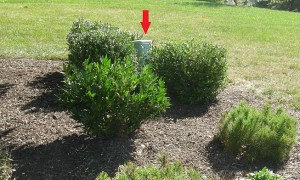How to Protect Your Plants from Hungry Deer
The extensive deer population is a problem for many homeowners in the Philadelphia area. If you need to take action to protect your plants, this article provides pros and cons on several popular methods.
Imagine spending Sunday morning working your way through a stack of pancakes and the Philadelphia Inquirer, when you glance out the window and realize that you’re not alone. The deer gathering outside are also eating breakfast, which happens to be the new pansies in your flower garden. Opening the window and shooing them away is a temporary solution, but if you need to take long-term action to protect your plants from these unwelcome visitors, here are a few ideas:
Home Remedies
When deer roam onto your property, you may be tempted to use a low cost deer be gone home remedy to protect your plants. Most of these strategies are worth the price you paid for them (almost nothing); although, you might just happen upon an overly sensitive deer that cannot stand the smell of Irish Spring soap or pepper running through your backyard.
Deer Fence
The Pennsylvania Gaming Commission’s Community Guide to Urban Deer Management recommends that barrier fencing for the purpose of keeping deer out of your yard should be at least eight feet high. To be fully effective, the mesh or fencing would need to wrap around your entire property, which is expensive and unsightly. Deer fencing can be cost effective for small gardens or individual trees, but it’s still not the most aesthetically pleasing solution.
Deer Resistant Plants and Trees
Some plants and trees are more appetizing to deer than others, so if you are planning new landscaping in your yard, your initial plant selection is a great way to avoid future deer problems. White-tailed deer, the native species in Pennsylvania, likely enjoy your rhododendrons, mountain laurels, and day lilies, which are some of their favorite foods found around Philly.
If you notice an upswing in the number of deer roaming your neighborhood, you may want to opt for plants described as deer resistant. When planting annuals, sun-loving vincas are hardy enough for hot and humid Philly summers, and their bright colors lend a tropical feel to flower beds. Typically, white-tails don’t eat them. According to David Jones, arborist at Bucks Country Gardens in Doylestown, Pennsylvania, marigolds, snapdragons, and heliotrope are also good choices if you’re searching for deer resistant annuals.
Rutgers University’s Agricultural Experiment Station has compiled a deer resistance rating system that places local plants and trees in categories based on their observed frequency of deer damage. Recommended deer-resistant trees and plants commonly used in Philadelphia area landscaping include boxwoods, dwarf Alberta spruces, and American hollies. Spring daffodils were also placed in category A, meaning they are rarely damaged by deer, but tulips were among the lowest rated, in category D, meaning they are frequently damaged.
Deer Repellent
If you already have landscaping in place, deer repellent sprays, like the one made by Liquid Fence, are available in many garden stores. The cost is steep, around $40 for enough solution to mix four gallons of the deterrent, and the product label recommends monthly reapplication and respraying after heavy rains. Liquid Fence is labeled eco-friendly and contains natural materials, such as egg solids, garlic, and thyme. The initial odor is quite harsh, but it fades to human senses shortly after application.
No matter which plant protection plan you choose, keep in mind that uncontrollable factors such as the weather and the local food supply will also contribute to your ultimate success. Still, anything you can do to encourage your neighborhood deer to search elsewhere for their next meal will preserve the longevity of your landscaping and save you the time and effort of replacement.
[cf]skyword_tracking_tag[/cf]





1 Comment
Jeff Ryan
July 21, 2013Deer Repellent Packs are what we use to keep deer away from our plants and landscaping. They also have a very unique tool on their site for finding plants that are resistant to deer damage. You can find this natural deer repellent here: http://www.deerrepellentpacks.com